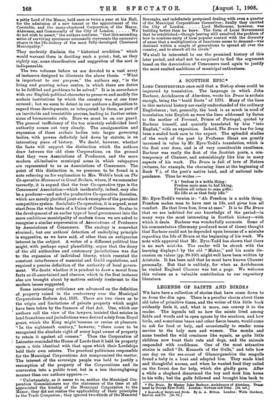A SCOTTISH EPIC.*
LORD CHESTERFIELD once said that a Bishop alone could be improved by translation. The language in which John Barbour, Archdeacon of Aberdeen, wrote his Bruce is ,archaic
enough, being the " braid Scots" of 1375. Many of the lines in this metrical history are easily understanded of the ordinary Englishman ; but, generally, the book is as much in need of translation into English as were the lines addressed by Satan to the mother of Ferrand, Prince of Portugal, quoted by
Barbour himself, and quaintly translated by him "into English," with an exposition. Indeed, The Bruce has for long
been a sealed book save to the expert. The splendid studies of the work of the poet by Professor Skeet are greatly increased in value by Mr. Eyre-Todd's translation, which is the first ever done, and is of very considerable excellence.
Barbour was really the first of the Scottish poets, a con- temporary of Chaucer, and astonishingly_ like him in many
aspects of his work. The Bruce is full of love of Nature (witness, for example, the charming lines at the beginning of Book V.), of the poet's native land, and of national inde- pendence. Thus he writes :—
" A I fredom is a noble thing: Fredom mais man to haf liking, Fredom all solace to man giffis : He lifis at es that frely lifis."
Mr. Eyre-Todd's version is : " Ah Freedom is a noble thing.
Freedom makes man to have zest in life, and gives him all comfort. He that lives free, lives at ease." It is to The Bruce that we are indebted for our knowledge of the period—in many ways the most interesting in Scottish history—with
which it deals. Barbour was wonderfully accurate. Some of his commentators (Germany produced most of these) thought that Barbour could not be depended upon because of a mistake regarding the life of Bruce at the beginning of his work. We note with approval that Mr. Eyre-Todd has shown that there is no such mistake. The reader will be struck with the learning displayed by the old " Maker," and his acute dis- cussion on valour (pp. 90-100) might well have been written by Aristotle. It has been said that be must have known Chaucer personally. But that is unlikely, for when as Archdeacon he visited England Chaucer was but a page. We welcome this volume as a valuable contribution to our expository literature.


































 Previous page
Previous page